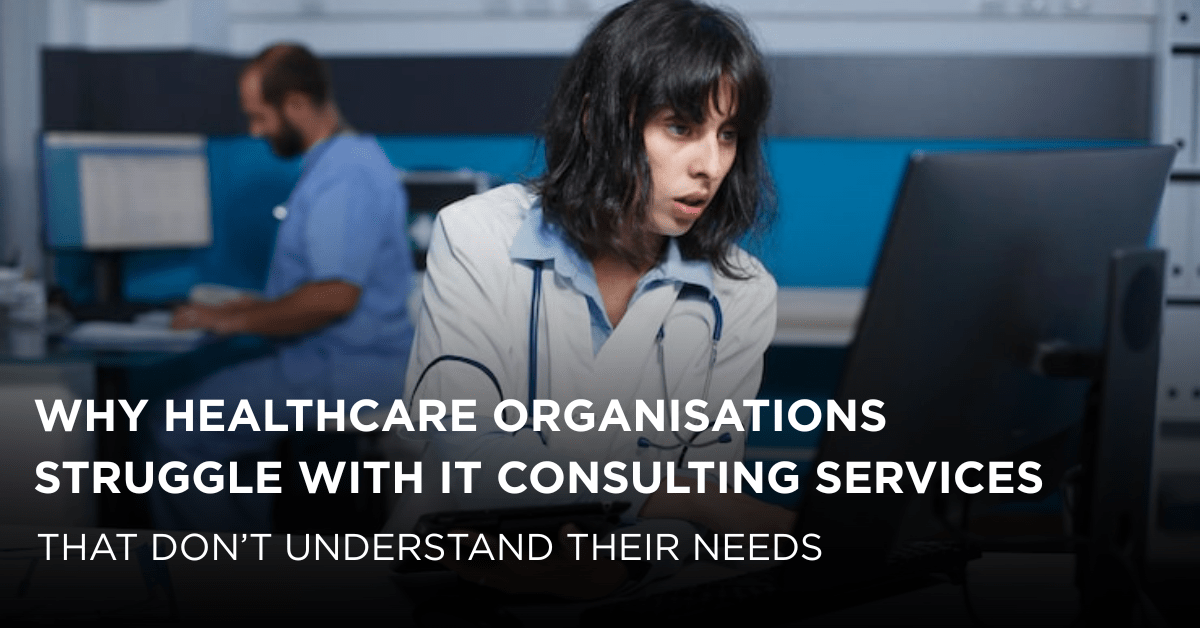In today’s modern digital age, even small businesses can easily look like big brands. The…

Why Healthcare Organisations Struggle with IT Consulting Services That Don’t Understand Their Needs
Imagine a world-class heart surgeon being asked to fix a complex software bug. Or a brilliant software engineer being handed a scalpel and told to perform surgery. It sounds absurd, right? Yet, a similar mismatch happens every day in hospitals, clinics, and medical centers around the world when they hire general IT Consulting Services that don’t truly understand the healthcare world.
Technology is the heartbeat of modern healthcare. From storing sensitive patient records to enabling life-saving telehealth appointments, a robust IT system is no longer a luxury—it’s a critical utility. But when the IT consultants you bring in speak a different language, prioritize the wrong things, or offer generic solutions, it doesn’t just hurt your budget. It can slow down your staff, risk patient safety, and create massive headaches.
This article dives deep into why healthcare organisations often struggle with these mismatched partnerships. More importantly, we’ll guide you on how to find the right IT services consultant—one who gets it.
Role IT Consulting Services Play in Healthcare
First, let’s be clear: good IT consultants are invaluable. In healthcare, their job is to be more than just tech support. They are strategic partners who should:
- Secure Patient Data: Implement iron-clad security to protect confidential health information from cyber threats.
- Manage Electronic Health Records (EHRs): Ensure systems for storing and accessing patient records are fast, reliable, and user-friendly for doctors and nurses.
- Telehealth: Set up seamless and secure platforms for virtual patient consultations.
- Ensure Compliance: Make sure every piece of technology follows strict laws like HIPAA in the U.S., GDPR in Europe, or similar local regulations that protect patient privacy.
- Improve Interoperability: Help different systems (like lab software, pharmacy databases, and EHRs) “talk” to each other, preventing dangerous information silos.
When done right, the right IT Consulting Services can transform a chaotic clinic into a smooth, efficient, and incredibly safe environment for both patients and staff.
Why Healthcare IT Consulting Services is Different
So, why is there such a disconnect? Healthcare isn’t like a retail store or a standard office. Its needs are unique, urgent, and incredibly high stakes.
Lack of Industry-Specific Knowledge
This is the biggest and most common problem. Many consultants have excellent general IT skills but zero healthcare experience.
- The Gap: Knowing how to set up a server is not the same as knowing how to configure one for storing large medical imaging files (like MRIs and CT scans) that need to be accessed in seconds during a medical emergency.
- The Regulation Blind Spot: Laws like HIPAA aren’t just suggestions; they are legal requirements with severe penalties for breaches. A generalist might not build systems with these rules as the foundation. For example, they might suggest a popular cloud storage solution that isn’t certified for storing protected health information (PHI), putting the entire organization at risk of massive fines.
- Real-World Example: A consultant might recommend a standard customer relationship management (CRM) tool to manage patient appointments. But a healthcare-specific practice management system is built to handle insurance verification, patient co-pays, and complex scheduling in a way a standard CRM never could.
Communication Gaps
Have you ever listened to IT professionals talk to each other? It can sound like a different language full of acronyms and jargon. Now imagine that person trying to explain a network infrastructure upgrade to a busy nurse who just needs to know how to quickly pull up a patient’s allergy list.
- Tech Speak vs. Care Speak: Consultants often use highly technical terms, while healthcare staff explain their needs in terms of patient care workflows. This leads to frustration and misunderstandings.
- Misaligned Goals: Hospital management might be focused on the big-picture budget and efficiency gains. The doctors and nurses are focused on how a new system will affect their minute-to-minute workflow with patients. The IT team might be focused purely on technical performance. If the consultant doesn’t bridge these gaps, the final solution will satisfy no one.
One-Size-Fits-All Solutions
Many large IT firms operate by selling pre-packaged, off-the-shelf solutions. They try to fit your square-peg healthcare organization into their round-hole software.
- Why Customization is Key: A one-size-fits-all EHR system will fail if it doesn’t account for the specific workflow of an oncologist versus a pediatrician. The way a radiologist interacts with technology is completely different from how a pharmacist does.
- The Interoperability Problem: Generic packages often struggle to integrate with the existing mosaic of specialized medical equipment and software. This lack of integration forces staff to manually enter data across multiple systems—a tedious process that introduces errors and wastes precious time.
- The Impact: Rigid, non-custom solutions lead to clunky, inefficient processes. Staff are forced to adapt their life-saving work to the limitations of the software, instead of the software empowering them to do their best work.
Compliance & Data Security Challenges
Patient confidentiality is sacred. A data breach in a healthcare organization isn’t just about leaking credit card numbers; it’s about exposing someone’s most private health details.
- The Consultant’s Miss: A general IT services consultant might prioritize speed and cost over security. They might not understand the specific technical, physical, and administrative safeguards required by law.
- The Risks: The risks are enormous. Beyond multi-million-dollar fines for compliance failures, a data breach destroys patient trust. It can also directly impact patient care if critical systems are locked down by a ransomware attack.
- Reality: Cybersecurity in healthcare isn’t a side project; it must be the number one priority woven into every IT decision. Consultants who don’t live and breathe this reality are a liability.
Cost vs. Value Conflicts
Healthcare organizations, especially smaller clinics, operate on tight budgets. They need to see a clear return on investment (ROI) for every dollar spent.
- Expensive, Unclear Solutions: Some consultants push for the biggest, most expensive system without clearly demonstrating how it will save time, reduce errors, or improve patient outcomes. They sell features, not value.
- The Budget Squeeze: When presented with an overwhelming price tag, management might be forced to cut corners—perhaps opting for a cheaper system without critical security features or skipping essential staff training. This false economy leads to far greater costs down the line in inefficiency, security incidents, and system overhauls.
- The Right Perspective: A good consultant understands budget constraints and finds smart, scalable solutions that deliver maximum value for the investment, clearly linking technology to improved care and operational savings.
Resistance to Change in Healthcare Staff
Doctors, nurses, and medical staff are incredibly dedicated, but they are also overworked. Throwing a new, complex software system at them without proper support is a recipe for disaster.
- Why Resistance Happens: It’s not that staff are “stubborn.” They are worried about anything that could slow them down or distract them from patient care. A poorly designed system that adds even two minutes to every patient interaction can derail an entire day’s schedule.
- The Consultant’s Failure: If the consultant’s job ends the moment the software is installed, they have failed. They must provide comprehensive, role-specific training and ongoing support. They need to design systems with the user experience (UX) of the healthcare professional front and center.
- A Classic Example: The infamous failure of many early EHR systems is a testament to this. Doctors rejected them because they were clunky, required too many clicks, and interrupted the natural flow of a patient consultation. The technology was fighting the user instead of helping them.
The Real-World Cost of Getting IT Wrong
The consequences of choosing the wrong IT Consulting Services partner are severe and far-reaching:
- Wasted Money: Thousands, even millions, can be poured into a system that doesn’t work, leading to sank costs and the need to start over.
- Staff Burnout: Frustrating, inefficient technology is a major contributor to burnout among healthcare professionals. It adds to their cognitive load and takes the joy out of their work.
- Patient Care Risks: Appointments run late, critical test results are delayed or lost in the system, and medication errors can increase due to poor software design.
- Loss of Trust: The organization loses faith in IT’s ability to help, often leading to a “shadow IT” culture where departments implement their own unsanctioned and insecure solutions.
How the Right IT Consultant Can Be a Game-Changer
The right partner doesn’t just install software; they become a trusted extension of your team. Here’s what they bring to the table:
- Healthcare Fluency: They speak your language. They understand terms like clinical workflow, patient portal, and meaningful use. They’ve likely worked with other providers, whether it’s a large hospital network or a local IT consultant Brisbane-based practice who understands Australian healthcare regulations.
- Proactive Compliance: They build security and privacy into the DNA of every solution they propose, ensuring you are always audit-ready.
- User-Centered Design: They design and recommend technology based on how your staff works, minimizing disruption and maximizing adoption.
- True Partnership: They don’t just disappear after the sale. They offer ongoing support, training, and strategic advice as your needs and technology evolve.
When you find a licensed consulting service near me that specializes in healthcare, you’re not buying a product; you’re investing in a partnership for better care.
Your Checklist for Choosing the Perfect Healthcare IT Partner
Finding the right fit requires diligence. Here are key steps to take:
- Define Your Needs Clearly: Before you even start looking, get input from doctors, nurses, administrators, and front-desk staff. What are their biggest pain points? What would make their jobs easier?
- Ask About Healthcare Experience: This is non-negotiable. Ask potential consultants: “How many healthcare clients have you worked with? Can you provide specific case studies?” Look for experience with organizations of your size and specialty.
- Check Credentials and Certifications: Do they have certifications specific to healthcare IT? Do they have partnerships with major healthcare software vendors? This demonstrates a committed focus.
- Prioritize Local Knowledge (Where Applicable): While not always essential, a local firm, like an IT consultant Brisbane for Australian practices, can have a deep understanding of regional compliance laws and offer more responsive, in-person support. Searching for a “licensed consulting service near me” can yield partners with this valuable local expertise.
- Demand Excellent Communication: During your first meetings, gauge how they communicate. Do they listen more than they talk? Do they explain complex concepts in clear, simple language? Do they seem genuinely interested in your challenges?
- Ask About Training and Support: What is their plan for rolling out the new system? How will they train your staff? What does their ongoing support look like? Avoid those who are vague on these details.
The Future of Healthcare IT Consulting Services
The future is exciting—filled with AI-driven diagnostics, advanced telehealth, and smarter data analytics. But this makes choosing the right consultant even more critical. They need to be a guide who can help you navigate these trends responsibly and securely. The relationship must shift from a one-time transaction to a long-term strategic partnership focused on innovation and continuous improvement.
Conclusion
Healthcare organisations struggle with generic IT Consulting Services because patient care is not a generic business. It operates under unique pressures, ethical obligations, and life-or-death stakes. The stakes are simply too high for a one-size-fits-all approach.
The struggle ends when you find a partner who respects the mission of healthcare. You need IT consultants who see themselves as enablers of care, not just installers of technology. By choosing a specialized, healthcare-aware IT services consultant, you invest in more than just hardware and software. You invest in smoother workflows, safer patients, protected data, and a more resilient future for your organization.
Make the choice to partner with IT Consulting Services that don’t just understand technology—they understand healing.



